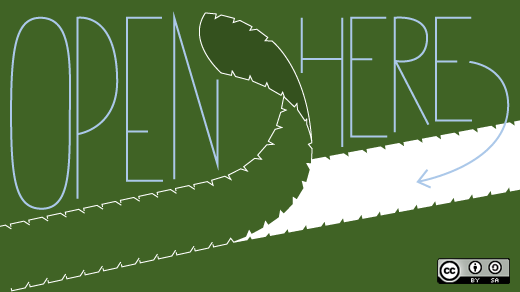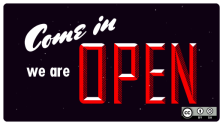Welcome back, ladies and gentlemen, to my fourth installment of Six Degrees. Thanks for the tremendous support, suggestions, and feedback since I kicked this off. It all helps me to write something that is hopefully worth reading.
If not, just move right along; there is plenty of other stuff on the Internet to read. Last resort? Try Buzzfeed.
OK, let's get started.
While the notion of free software has lasted since the days Richard Stallman was sleeping under his desk at MIT, the full thrust of collaboratively and openly licensed software really took off with the advent of Linux.
Linux took a principle and filled in an important technology gap that inspired the filling of a thousand other gaps too. This led to the rise of the venerable Linux distribution, as myriad as consumer-grade platforms such as Ubuntu and Fedora, to server-grade such as CentOS and Debian, and down to the downright weird such as RebeccaBlackOS.
For those of us born in the brine of Linux, openness and a commitment to living and breathing openness have always been common social components. It is not uncommon in the Linux world to use a Linux distribution and entirely open source applications with a few exceptions, such as Skype and Steam.
Despite some rather remarkable projects, desktop Linux has always struggled to get a hold of the market, hovering at around 1.5% of overall market share. While the server, cloud, and infrastructure siblings to the Linux desktop have gone on to dominate, the desktop has been lagging behind, despite passionate and high-quality efforts from projects such GNOME, KDE, Elementary, and many others.
An eternal student in community
When I first discovered open source, to say it grabbed me by the scuff of the neck is an understatement. I became instantly obsessed. It wasn't the software—that was cool and all—it was this notion of people working together to create something bigger than any individual that gripped me. I loved how it provided a way in which anyone had the opportunity to make a difference. It was empowering.
I have devoted my career to trying to understand communities and leadership, how it works, and how we can help communities and organizations to be successful. My goal has been to understand the markers on the map of a successful community or organization, and to be able to recreate those markers in other communities and organizations too.
Throughout this time though, my overarching goal has changed somewhat.
When I started out, my singular focus was on Linux. I wanted to make Linux successful and try to play at least a small role in the global effort to make it a genuine alternative to platforms such as Windows and Mac. The openness I mentioned earlier was the connective tissue here: like many others, I felt the right approach was to use a fully open platform and help to make it better.
My view was essentially that open source was required at every level of the stack, from the kernel right up to the applications.
While I will always be a passionate Linux fan and user, and I believe that this full spectrum of openness is still incredibly important, I do think the opportunity here is much broader than Linux alone: it is about community collaboration in whatever avenue, nook, and cranny it may exist.
It starts with a hack
Open collaboration has tremendous potential. It has the ability to educate, inspire, solve major challenges, and bring cultural empowerment.
It helps ideas and innovation bubble to the surface, spearheaded by the smart, not just the smart-talker. Done right, open collaboration can have world changing effects.
In trying to understand what the magic ingredients are in successful collaborative communities, it seems the key is in connecting creativity to technology and then to collaboration. It is about empowering the maker to make.
Something I have learned over the years is that practical innovation generally doesn't start with a grandiose vision—it starts with a hack. The vision is important, it stimulates conversation, it justifies an investment of energy, and lays the track down in the right direction, but the hack gets the train on the rails and rolling.
Anyone can have a vision, but the hack is real. It provides tangible material that can be twisted, contorted, experimented with, and explored. It provides a focus for engineering, science, and practical assessment. It can be pulled apart, refined, and buffed from a hack into a real thing.
Whether it was Linus Torvalds' first kernel, the first incarnation of Wikipedia, the first Raspberry Pi board, or anything else, the world's greatest innovations all started with that one person just making something.
What transforms a hack into something with potential is that it is (1) shared freely, (2) formulated with free tools that anyone can access, and (3) invites participation from other people who can make the hack better.
As such, if we want to unlock innovation around the world, empower people to create incredible things, and further technology development and problem solving, we need to ensure that everyone has access to the tools and knowledge to (a) create their first hack, and (b) be able to engage with other people's hacks too.
Cross platform
To achieve this, we need to assure those three pieces I mentioned earlier—sharing, tools, and collaboration—are available wherever the makers are.
While I wish the entire world were using Linux, a significant portion of makers are on other platforms. They are on Macs adorned in nerdy stickers, on Thinkpads running Windows, even a few ChromeBooks thrown around here and there.
It can be tempting to be lulled into the view that openness on top of Mac or Windows isn't really openness.
I see this often when I go to open source conferences where many Linux fans feel frustrated that open source folks are using non-open source operating systems such as Macs. I think for some it feels like a small sense of betrayal, and if not betrayal, just a sense that these people are "letting the side down."
This isn't as big of a deal as it might seem.
Most people just don't care about operating systems. For these people, an operating system is about as interesting as electricity, water pipes, or gas lines: it is key to successful operation, but not their center of interest. An OS is just necessary plumbing.
They instead care about their data, their applications, and their work. In many cases people just want a computer that is reliable and an OS that keeps on trucking with as little distraction as possible.
This is why so many people use Macs. You can walk into a store and get a hardware and software combo that, by and large, just works. Yes, there is less choice and it is more locked down in some ways, but many of these people don't care about those specific choices, they just want their stuff to work, and their stuff is data, apps, and their creative ambitions.
As such, for us to really foster openness and innovation, cross platform applications with a focus on open data standards and formats are critical. This will allow everyone to play in the open source collaborative sand pit, irrespective of whether you are on Linux, Mac, Windows, or anywhere else.
A great example of this is LibreOffice. It is entirely cross-platform and has at its core a set of open standards. LibreOffice not only prevents vendor lock-in, but it provides an assurance that your data will be available and modifiable from different users across different platforms. At this point, if your data is in OpenDocument format, who cares whether the user is on Linux, Mac, or Windows? What matters is that they can collaborate, that the tool is available, and that the data can be shared in an open way.
The crux of my argument is that the key ingredients we need to protect to assure innovation and collaboration are open and accessible creation tools and open and accessible data. What is important is that we ensure open access.
Now, this is not to say Linux is not a critical piece here. While I am advocating a cross-platform world at the app and data layer to ensure makers can play irrespective of their platform, I do believe that Linux support for these cross-platform apps is essential. I don't see cross platform here as just Mac or Windows.
Having a Linux version of apps available is important to ensure that those with the tightest of budgets, be it individuals, schools, community centers, or others, will always have free tools available to collaborate from the ground up. Linux is also important because it is ultimately hackable across the platform, and it has paved the way for innovation in unexpected places such as automotive, drones, embedded devices, and elsewhere.
Now, I am certain that some people who haven't read up to this point are going to get shouty in the comments. They will accuse me of being a sellout, that I don't care about Linux anymore, and that I am anti-free software.
This is bollocks.
Linux is critically important. Openness should be engineered from top to bottom in our computers, devices, and elsewhere. I am still a passionate Linux user who will always recommend Linux first and foremost to people.
Where I have changed my view is that the Mac and Windows world is dripping with people just like us too. They are smart people who also want to create interesting things and make the world a better place. They just don't jive with Linux, and that is totally fine.
Let's encourage a world in which Linux is a choice, not a social obligation. This will help us to reach more people, open up more innovation, make our cross platform tools and data better, and grow the wider outreach and potential of open source and open collaboration.
What do you think, folks? Think this makes sense? Think I am full of nonsense? Let me know in the comments!
Degrees
This article is part of Jono Bacon's Six Degrees column, where he shares his thoughts and perspectives on culture, communities, and trends in open source.







13 Comments